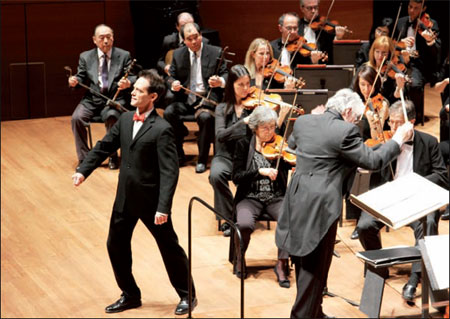I Sing Beijing's debut hits a high note
Updated: 2013-02-22 14:04
By Derek Bosko in New York (China Daily)
|
||||||||
|
Thomas Glenn, center left, sings the Chinese opera Siege of Tiger Mountain at the Lincoln Center in New York on Feb 16 as part of the I Sing Beijing program. Hu Haidan / China Daily |
There's no doubt that I Sing Beijing, a redolent blend of musicians, Western traditions and modern Chinese opera, is an important catalyst in the evolving relationship between the United States and China.
But the company, which made its US debut on Feb 16 at Lincoln Center's Alice Tully Hall, is also providing an unforgettable experience for a couple of dozen Western artists by introducing them to Mandarin as an idiom for classical singing.
Prior to last week's performance, the singers participated in intensive Mandarin lessons, vocal coaching and stagecraft workshops with top coaches from New York's Metropolitan Opera, Seiji Ozawa Music Academy, Beijing's Central Conservancy and the Shanghai Conservatory.
The fruits of those labors were much in evidence. The Western singers joined forces with rising stars from China in an eclectic program that included scenes and arias from the Western repertoire coupled with a historical tour of contemporary Chinese vocal works.
Xiaoli Meng-Lumpkin, a New York based therapist in the audience, said she was markedly impressed with both the singers' skill and their relative youth. The company's performance of Happy Spring Awakening from the Chinese opera Siege of Tiger Mountain resonated loudly with her because "I grew up with that Beijing opera, during the cultural revolution (1966-76)" and "that's the only opera we had during those times".
One of only eight 'model plays' sanctioned for performance then, Siege of Tiger Mountain tells the tale of Yang Zirong, who successfully infiltrated the bandit-controlled mountain of the title. Borrowing a page from the ancient Greeks' book, Yang employs a Trojan-horse-style ruse to fool the bandits and help soldiers retake the mountain.
Now in its third year as a program, I Sing Beijing reflects the growing migration of modern Chinese music into Western classical music.
But another spectator, Patty Kopec, a professor and multi-instrumentalist at the Manhattan School of Music, dismissed typical American definitions of opera as narrow.
"Music is an international language and it speaks to the heart", Kopec said. Despite stark differences in the linguistic and musical conventions of Chinese and Western opera, the key to a successful performance, she said, is "not just to sing but to understand the content because then you sing from within and from your heart". Kopec noted one-third of her students at the Manhattan music school are Chinese nationals, an example of China's growing embrace of Western culture.
I Sing Beijing is just one example of growing Chinese cultural influence around the world. The program, co-founded by Hanban, which administers Confucius Institutes, and the Asian Performing Arts Council, promotes Chinese culture, particularly operatic styles, internationally.
While the program was created with the idea of reviving and spreading Chinese songs, it also aims to fuse Chinese and Western elements together.
I Sing Beijing holds annual auditions for Western opera singers. Those who are selected receive scholarships for intensive Chinese language study coupled with musical coaching in Beijing during the summer.
Of the 20 to 30 Western opera singers who are selected for the program, none have prior knowledge of Mandarin Chinese.
The music that captivated the audience is the brainchild of the program's Artistic Director Hao Jiang Tian. Tian grew up in China and came to the US in 1980s.
A professional opera singer in the West for over 27 years, he says he always dreamed of bringing not only singers, but also conductors and instrumentalists, to China to help them get a sense of the texture of Chinese culture. Many of the songs popular during Tian's youth were adapted for the I Sing Beijing program.
Above all, I Sing Beijing is about promoting cross-cultural understanding and the burgeoning Chinese contemporary operatic scene, Tian told China Daily earlier.
Haidan Hu contributed to this story.
dbosko@chinadailyusa.com

 In Photos: 7.0-magnitude quake hits Sichuan
In Photos: 7.0-magnitude quake hits Sichuan
 Li Na on Time cover, makes influential 100 list
Li Na on Time cover, makes influential 100 list
 FBI releases photos of 2 Boston bombings suspects
FBI releases photos of 2 Boston bombings suspects
 World's wackiest hairstyles
World's wackiest hairstyles
 Sandstorms strike Northwest China
Sandstorms strike Northwest China
 Never-seen photos of Madonna on display
Never-seen photos of Madonna on display
 H7N9 outbreak linked to waterfowl migration
H7N9 outbreak linked to waterfowl migration
 Dozens feared dead in Texas plant blast
Dozens feared dead in Texas plant blast
Most Viewed
Editor's Picks

|

|

|

|

|

|
Today's Top News
Live report: 7.0-magnitude quake hits Sichuan, heavy casualties feared
Boston suspect cornered on boat
Cross-talk artist helps to spread the word
'Green' awareness levels drop in Beijing
Palace Museum spruces up
First couple on Time's list of most influential
H7N9 flu transmission studied
Trading channels 'need to broaden'
US Weekly

|

|








